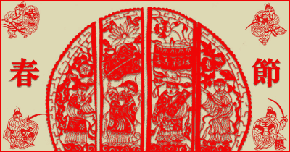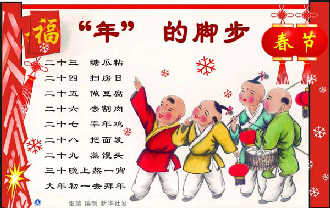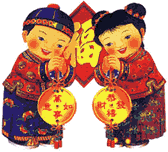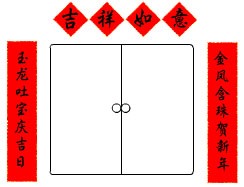
Spring Festival, the Lunar New Year, commonly known as the Chinese New Year, generally the fifteenth day of the twelfth lunar month 23 Jizao, some from the eighth day of the twelfth lunar month, has been off to a positive end of which the New Year's Eve and New Year's Day climax. Continuation of long Spring Festival time, a wide geographical span, festivals, is China's most important, the most solemn, and is also the oldest, the most popular traditional festivals.
 The beginning of the year of the Chinese Lunar New Year, known as Spring Festival. Is the most ceremonious traditional festival of the Chinese people, but also a symbol of unity, prosperity, new hope for the future sustenance Festival. According to records, the Chinese people for the New Year more than 4,000 years of history.There are many theories about the origin of Chinese New Year, but the argument is generally accepted by the public, the Spring Festival is played by Yu Shunxing. 2,000 years BC, the day Shun emperor bit, led his men personnel, worship heaven and earth. Since then, people put on this day as the beginning of the year. It is said that this is the origin of the Chinese New Year, and later called the Spring Festival. Spring Festival is also called the New Year's Day in the past. Spring Festival, which this month called January.
The beginning of the year of the Chinese Lunar New Year, known as Spring Festival. Is the most ceremonious traditional festival of the Chinese people, but also a symbol of unity, prosperity, new hope for the future sustenance Festival. According to records, the Chinese people for the New Year more than 4,000 years of history.There are many theories about the origin of Chinese New Year, but the argument is generally accepted by the public, the Spring Festival is played by Yu Shunxing. 2,000 years BC, the day Shun emperor bit, led his men personnel, worship heaven and earth. Since then, people put on this day as the beginning of the year. It is said that this is the origin of the Chinese New Year, and later called the Spring Festival. Spring Festival is also called the New Year's Day in the past. Spring Festival, which this month called January. 
However, China's ancient New Year's date is not consistent: Xia Dynasty with Meng January for the first month, the Shang Dynasty used the twelfth lunar month (December) for the first month after Qin Shi Huang in October for the first month, the Han dynasty early follow Qin calendar. Was too messy calendar Ji Han dynasty, on command Minister Gongsun Qing and Sima Qian made the solar calendar, the provisions of the first lunar month to the first to the first day of the first month, the first day of the year is New Year's Day. Since then the Chinese lunar calendar (lunar calendar, also known as the Annals of the Lunar New Year) has been in use, and not until the Qing dynasty years, up to 2080.
Chinese New Year in different times with different names. In the pre-Qin called "previous day", "Mongol", "change year-old, offering year-old"; Han Dynasty is called "dynasties", "Year of the once", "Zhengdan", "Jong" ; called "yuan Chen Wei, Jin and Southern and Northern Dynasties," Mongol "," heads of state "," Year of the DPRK "; Tang Song, Yuan, Ming and known as the" new Year's Day "," "," Year of the day, "a new positive "," S ", etc.; Qing Dynasty, has been called the" New Year's Day "or" Mongol ".
 Sun Yat-sen in Nanjing in 1912 became the provisional president of the Republic of China, announced the abolition of the old calendar switched to the Gregorian calendar, the Gregorian calendar, with the Republic of Annals. And decided to January 1, 1912 for the first year of the Republic of January 1. January called the New Year, but not referred to the New Year's Day. But still traditional folk follow the lunar calendar that lunar calendar, still in the year Feb. 18 (Prince, the first day of the first lunar month) over the traditional New Year, other usual traditional festivals. In view of this, in July 1913 (two years), the total length of any of the House by the Beijing government to the President Yuan goes to a four o'clock the holidays report, said: "our old customs, the annual four seasonal section, that should be specified be invited on lunar New Year Spring Festival, the Dragon Boat Festival summer Festival, Mid-Autumn Festival autumn Festival, winter Solstice winter Festival, where I nationals had to rest, in the public and staff, also granted leave of absence on the 1st. "Yuan Shikai only approved to the first day of the first lunar month agreed for the Spring Festival, the Chinese New Year holiday routine, will go into effect the following year (1914). Lunar calendar since the beginning of the year known as "Spring Festival".
Sun Yat-sen in Nanjing in 1912 became the provisional president of the Republic of China, announced the abolition of the old calendar switched to the Gregorian calendar, the Gregorian calendar, with the Republic of Annals. And decided to January 1, 1912 for the first year of the Republic of January 1. January called the New Year, but not referred to the New Year's Day. But still traditional folk follow the lunar calendar that lunar calendar, still in the year Feb. 18 (Prince, the first day of the first lunar month) over the traditional New Year, other usual traditional festivals. In view of this, in July 1913 (two years), the total length of any of the House by the Beijing government to the President Yuan goes to a four o'clock the holidays report, said: "our old customs, the annual four seasonal section, that should be specified be invited on lunar New Year Spring Festival, the Dragon Boat Festival summer Festival, Mid-Autumn Festival autumn Festival, winter Solstice winter Festival, where I nationals had to rest, in the public and staff, also granted leave of absence on the 1st. "Yuan Shikai only approved to the first day of the first lunar month agreed for the Spring Festival, the Chinese New Year holiday routine, will go into effect the following year (1914). Lunar calendar since the beginning of the year known as "Spring Festival".
September 27, 1949, the first plenary session of the Chinese People's Political Consultative Conference (CPPCC) decided in the establishment of the People's Republic of China at the same time, the use of the common Gregorian calendar in the world. "Year", because of year 24 solar terms "spring" in order to distinguish between solar and lunar two just before and after the Lunar New Year, so the Gregorian calendar January called "New Year's Day, the first day of the first lunar month of the Chinese lunar officially renamed the" Spring Festival ".
 Earth around the Sun once, called on the calendar year of the cycle never ends. However, depending on the four seasons of spring, summer, autumn and winter solar terms, the people on the first day of the first lunar month of the lunar calendar year of the beginning of the year. Annual Lunar New Year December 30 (Satsuki twenty-nine) the middle of the night after midnight (12:00), the Spring Festival, even if officially arrived.
Earth around the Sun once, called on the calendar year of the cycle never ends. However, depending on the four seasons of spring, summer, autumn and winter solar terms, the people on the first day of the first lunar month of the lunar calendar year of the beginning of the year. Annual Lunar New Year December 30 (Satsuki twenty-nine) the middle of the night after midnight (12:00), the Spring Festival, even if officially arrived.
Spring Festival approaching, people purchase New Year, New Year's Eve, a family reunion to eat dinner together. Stickers New Year, Spring Festival couplets; greet the new year.
 With the founding of New China, the Chinese New Year celebration more colorful. Not only retains the folk customs of the past, to the exclusion of some of the activities with the feudal superstition, but also added a lot of new content. Chinese New Year with a new era. December 23, 1949, the People's Government of the People's Republic of China provides that the annual Spring Festival holiday for three days.
With the founding of New China, the Chinese New Year celebration more colorful. Not only retains the folk customs of the past, to the exclusion of some of the activities with the feudal superstition, but also added a lot of new content. Chinese New Year with a new era. December 23, 1949, the People's Government of the People's Republic of China provides that the annual Spring Festival holiday for three days.
China is a multi-ethnic country, the different forms of various ethnic New Year. About the customs of the Spring Festival of the Han, Manchu and Korean, family reunion, people eat rice cakes, dumplings and a variety of sumptuous meals, decorated, set off firecrackers and bless each other. Celebration of the Spring Festival period is extremely diverse, lion dance, playing the dragon, also on stilts, the solemn ceremony of. In some areas it followed the the past ancestors worship, pray for the new year, good weather, peace, good harvest. Ancient Mongolian, Chinese New Year is called "White Day", the first month called white month is auspicious meaning. Tibetans is over Cangli Nian. Hui, Uygur, Kazak, too "Corban. Chinese New Year is also Miao, Tong family, Yao and other grand festival.





